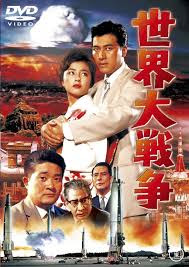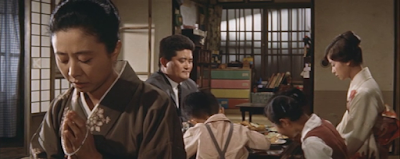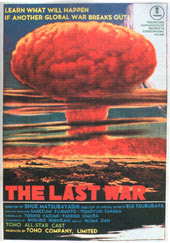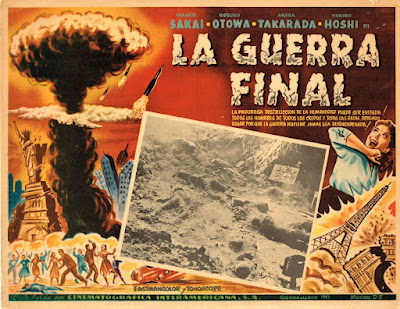The Last War

Director: Shue
Matsubayashi
Year: 1961
Rating: 6.0
A small traditional Japanese family sits down
to dinner. The father (Frankie Sakai), his wife (Nobuko Otawa), two small
children and their older daughter Saeko (Yuriko Hoshi) try to make conversation
but it is slow and halting. Over the course of the film we have come to have
affection for this family. The father speaks of how he and his wife had nothing
coming out of the war and through hard work he has given them a decent life.
A symbolic stand-in for the nation. Nothing fancy but all the basics with
a large dose of love. Saeko is engaged to a Navy man (Akira Takarada) who
is on duty out to sea. After dinner and visiting their tulips, the father
goes upstairs and screams into the void that he had dreams for his family.
A wedding for his daughter, college for his son, a job as a stewardess for
the daughter, a house near the sea for his ill wife. Then they gather and
wait. For the end. It is an emotional tidal wave. The world may be ending.

The film is a plea from Toho studio and
director Shue Matsubayashi for peace. To stop the risk of nuclear war. It
is both clumsy and powerful. It toddles back and forth between the two military
forces of the Federation (USA and allies) and the Alliance (Russia and allies),
the Japanese government trying to be the peace makers and the human element
- the family and a woman (Yumi Shirakawa) who runs a daycare center and her
father (Chishu Ryu).

The government and military aspects seem
rather one note and cartooish. Twice there are accidents that nearly set
off a nuclear war and they are just silly. None of these characters go beyond
cardboard figures. Where the strength of the film lies is with people. Ordinary
people who have no power, no influence, no say in world events. Just people
trying their best to get by. It is a two hour film and you wish the director
had cut out the scenes of the military and the endless Japanese govt conferences
and just focused on the people as the radio notifies them of the news. The
special effects are from Eiji Tsuburaya and the wonderful symphonic score
comes from Ikuma Dan who in fact composed eight symphonies. When the film
finally narrows it down to the people as they pray and await their fate,
it is a punch in the stomach.




